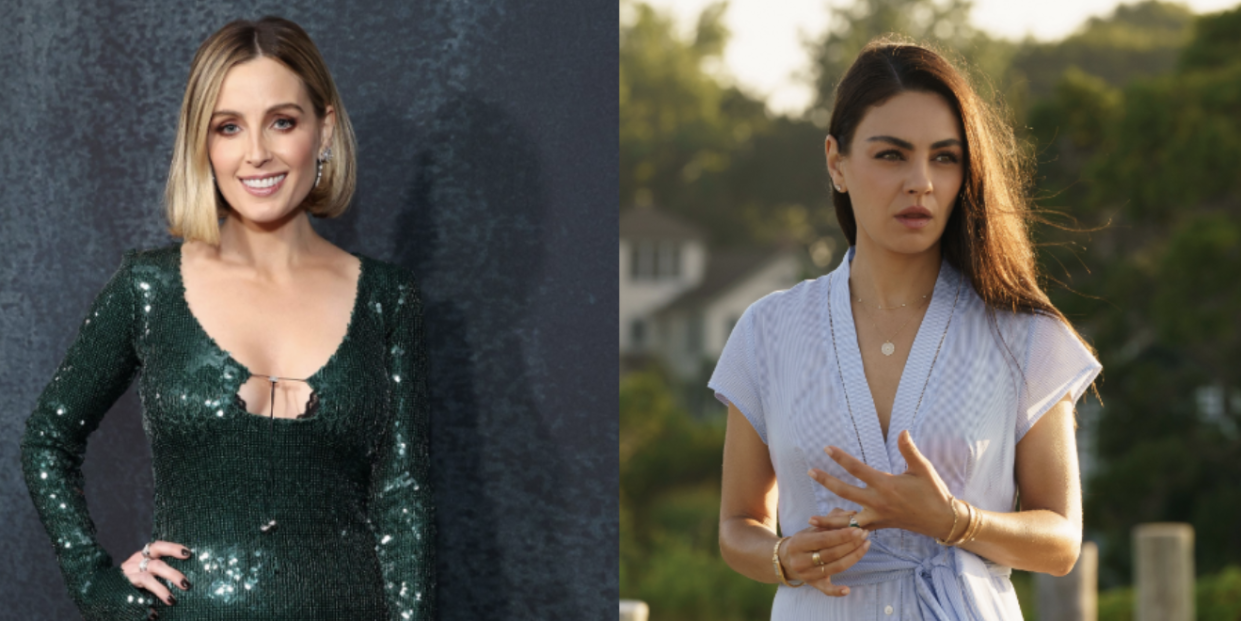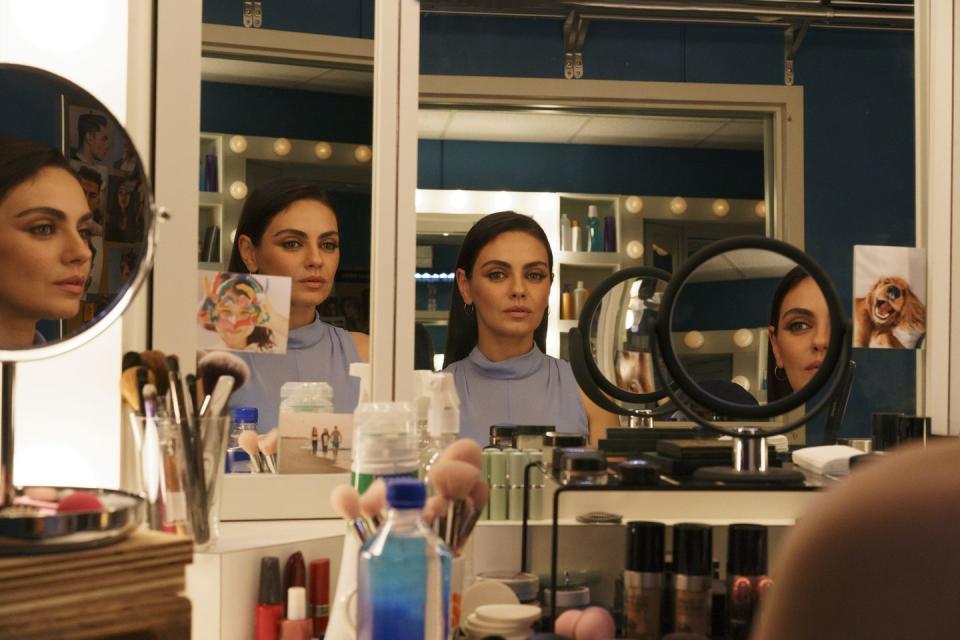Jessica Knoll Went From 'Cosmo' Star to Screenwriting 'Luckiest Girl Alive,' and She's Got A+ Stories

"Hearst Magazines and Yahoo may earn commission or revenue on some items through the links below."
When Jessica Knoll wrote her bestselling book Luckiest Girl Alive back in 2016, she couldn't possibly have known that if she flash-forwarded to 2022, she'd be hitting a red carpet in a green sequin gown alongside Mila Kunis after successfully writing the Netflix adaptation of her work herself. But here we are! The author, screenwriter, and Cosmopolitan alumna has achieved massive success, and Netflix version of her first novel is only further proof of it.
Luckiest Girl Alive debuts on Netflix this weekend, and the seven-year process of getting it on screen has hardly been easy. In the lead up to the release, Jessica hopped on the phone with her alma matter Cosmo to discuss Mila Kunis's performance as Ani Fanelli, her screenwriting pro-tips, and what ended up left on the cutting room floor.
Cosmopolitan: What was the adaptation process like? Did your camp approach Netflix?
Getting anything made is a lot. I find it amazing, because there's so much content out there, but it is a battle. When we first started off, we were with a different studio, we were with Lionsgate. They were very excited and enthusiastic about the project for the first few years, and then, as it happens, there was turnover. It just became very clear it was no longer really a priority. I emailed our producer Bruna Papandrea, and I was like, 'Do you know when the option is up?' We were able to work out a deal with Lionsgate where they released us from the option early. Ultimately, we found our home at Netflix.
What was the most rewarding part of this moviemaking process after Netflix gave you the green-light?
I think it was when Mila signed on. We had been trying to cast that role here and there over the years. When we started fresh at Netflix, Mila was really never someone we talked about because she hadn't done anything really dramatic since Black Swan. We weren't thinking about her as a dramatic actress, even though she has the chops and then some. Scott Stuber at Netflix was the one who was like, 'I think we should go out to Mila Kunis.' And as soon as he said her name, we were all like, 'Oh, my God, yes. Why did we not think of that before?'

We were like, 'Yeah, I'd love to have Mila Kunis play Ani, but she's never gonna. She's Mila Kunis. She's being offered everything, she's busy!' But then she responded and was like, 'I really liked this, let's talk.' And that, to me, was the best. We had just been stuck at that point for so many years trying to find our lead actress and it felt like, 'Oh my God. This could actually happen.' I was just beside myself.
What was it ultimately like working with Mila on this? What do you think of her portrayal of Ani?
I truly feel once I was on set and watching her perform the lines, it all coalesced for me in a way where I was like, 'I don't know that anyone else could have done this.' Because the whole thing with Mila that's so interesting is the bulk of her work has been things that are moreso comedies, and we know her as a certain personality, like being "America's Girl Next Door."
That is so critical to the character, who has an outward appearance that belies everything going on with her internally. I realized what actual perfect casting it was that you had someone who naturally brought that persona to the character, so when you hear what's really going on in their head, you're like, holy shit.
I was so struck by her performance. Something that stayed with me after watching it were those mirror shots where she doesn't even have lines.
Thank you for saying that. I agree, those are just some of the most stunning shots of the movie.

I read the Cosmo interview you did closer to when the book came out, and you said you wanted to be a screenwriter when you were younger, even though you didn't understand yet what it entailed. Now that you've done it, what did it entail? And what surprised you the most about it?
I think what surprised me the most about it is—and this is gonna sound really naive, and, you know, gullible of me—it's not just good dialogue. There's a need to be brief and concise because you only have so much real estate to establish certain turning points in the story, certain developments, certain relationships. You don't even always need a line to show that, it can be just a weighted glance. So I knew that in theory, but actually getting closer to production, it clarified things for me in a whole new way where I was like, 'You really have a responsibility as a storyteller to go beyond [dialogue].' I find that I'm really excited to dive into my next adaptation or screenplay, because now I understand this on such a deep level.
As you're talking, I'm thinking of all these scenes, too, that illustrate what you're saying. Like at the very end when Ani's alone, and it's the breakup, and the dialogue peters out into a wide shot.
Because you see, it's wide to encapsulate everything she's giving up. This great big life. This is everything you're walking away from.
You make a good point about real estate as well, particularly when you're adapting a book. Is there anything you had to leave on the cutting room floor that tugs at your heartstrings a bit?
Yes, definitely. Some of the Mr. Larson stuff was definitely hard to leave on the cutting room floor. And what's tough about it is the reason it's on the cutting room floor is ultimately my fault as a writer, because the way I wrote some of the scenes did not work with the flow of the movie and the emotional arc of where the character was at. I was trying to shoehorn something into the middle of the film without looking at the story holistically, and when we filmed some of these scenes that we left on the cutting room floor, even Mila was like, 'I just, I'm struggling with this scene.' That's always the thing with hindsight, where you're like, 'Oh, my God, of course. Now I get it.' It kills me a little bit because it almost feels like it would be easier to deal with if someone was just, like, a bad actor.
It sounds like baptism by fire, but also what a cool opportunity to grow.
Yeah, I will take that with me, and I'll be a better writer for it.
Did you find one more difficult than the other in terms of writing the book originally and then screenwriting the movie later on?
The thing with Luckiest Girl Alive is it's such a unique in my canon of work. I've now written three books—I just turned in my third book—and writing Luckiest Girl Alive was the most fulfilling creative experience of my writing career.
At the time I sat down to write that book, there were lots of factors at play that contributed to a switch flipping, and it just poured out of me. It just felt so cathartic and like, 'This is what I meant to be doing.' I could not wait to get back to the page.
With the adaptation, I also loved it. I love screenwriting, and I've gone on to write original screenplays and sold one to Amazon, and that's the next best writing experience I've had after writing Luckiest Girl Alive. It's like I wrote the book for me, and I wrote the screenplay for me. However, once you get deeper and deeper into the process, there are a lot of people the copy has to make its way through. At every stop on that train, that person has a note, and that person has an idea about how to make it better, or that person has a question because this isn't working for them. It drives you mad a little bit.
A lot of times, it just depends at what stage in the process I'm in that I prefer one medium to the other. So it comes and goes, and I have my moments where I want to throw my computer out the window whether I'm writing a screenplay or whether I'm writing a book. And then I have moments where I'm so happy I'm doing what I was put on the Earth to do, and I feel so creatively fulfilled with both as well.
Last question for you: I have to ask since we're both Cosmo people, how did your time working at Cosmo impact your career afterwards?
Literally everything. I keep going back to this anecdote of like, major actresses like Susan Sarandon who got their start on soap operas, and they credit the soap opera for teaching them everything about learning their lines and hitting their marks. It's like bootcamp. That's how I feel about Cosmo, it was writing bootcamp.
When I get these massive note documents from producers, the one thing the team has always said to me is, 'You're so good about notes. You don't complain, you take them in, and you find solutions that still manage to be true to the core DNA of the book and the voice.' I've had people tell me that's a rare thing. I know that's from magazines, I absolutely credit that 100 percent to working at Cosmo and pouring your heart into a piece and it comes back with a rainbow of notes and you're just like, 'Oh my God, it's such a mess.' But you figure it out, because you have a deadline.
Cosmo gave me the confidence to be a writer. I didn't know you could have that kind of life as a writer. I get very nostalgic when I think back to my Cosmo days, they were a really, really happy time in my life.
That's good to hear, and it's cool to watch you succeed. We're rooting for you!
That means so much. You know, you're my alma mater! So the next generation, I can't even imagine the things you guys will do.
This interview has been edited and condensed for clarity.
Watch 'Luckiest Girl Alive' on Netflix Here
You Might Also Like
